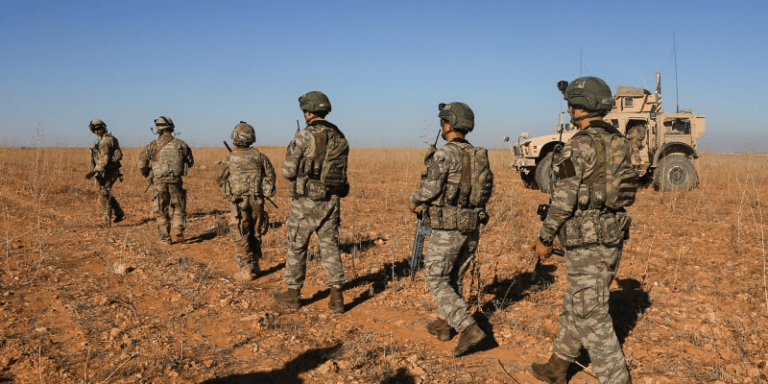
President Donald Trump’s sudden decision to pull 2,000 US troops out of northern Syria has shocked US policymakers and political leaders across the political spectrum, not to mention Washington’s western allies. Thus far, there has been little reaction from Israel and the Gulf states, although it is likely that the level of dismay is equally high. Not surprisingly, President Vladimir Putin has welcomed the decision. In a transparent bid to flatter Trump, the Russian president claimed that the United States has already dealt the Islamic State (IS) “serious blows.”
The problem, as IS watchers (and many in the US Congress) know—and as Pentagon officials have stated—is that the Islamic State is far from dead. Further, the US program to train Kurdish fighters is far from complete. But the larger and more fundamental issue, as this author has noted previously, is that the Trump Administration has no coherent strategy regarding Syria. Even if US and Kurdish troops managed to deal a final blow to IS, which would be an unlikely outcome, Washington would still face the daunting task of forging a wider Syria policy that would translate this potential tactical gain into a strategic dividend.
The IS problem is inextricably linked to two fundamental questions. First, how could the Syrian state be reconstituted with a system of governance that would invite—rather than hinder—national reconciliation? Second, what role can, or will, regional and global players play in fostering this dynamic? In reality, when it comes to both issues, the United States has little leverage. The key countries that are calling the shots are Russia, Iran, and Turkey, and how these countries will react to Trump’s decision will prove decisive. What they have working in their favor is the simple fact that when it comes to both Syria and Iran, the Trump Administration’s policies are in total disarray.
The Russian, Iranian, and Turkish Perspectives
There is little doubt that for Russia and Iran, Trump’s decision represents an opportunity. The presence of 2,000 troops in Syria—and the critical role that these troops have played in training largely Kurdish forces—has raised the specter of a post-conflict Syria divided into multiple zones, one of which might become a more-or-less permanent base for US troops. The withdrawal of these troops will make it easier for Moscow and Tehran to advance a political solution that would ensure that President Bashar al-Assad and his allies remain in power for a long time—and this is precisely the outcome that Russia and Iran favor.
That said, the US pullout could also be somewhat problematic—at least in the short run. The American presence has provided some hedge against a possible Turkish attack on Kurdish forces on the eastern side of the Euphrates. The fact that Kurdish forces, backed by the United States, played a key role in the war against IS raises the prospect that if and when Ankara launches its campaign, IS will be the chief beneficiary. This, however, would represent a tactical rather than strategic headache for Moscow and Tehran; as both have already shown, they have the means and the will to confront the Islamic State. Moreover, while Turkey’s assault on Kurdish forces would present Russia and Iran with new challenges, the fact of the matter is that in the last year, Moscow, Tehran, and Ankara have made a concerted effort to forge a common position on Syria’s political future through the Russian-directed Astana process. Turkey—whose president has repeatedly insisted that Assad is a “terrorist” and can play no role in Syria’s future—has now moved closer to Moscow and Tehran, and this strongly suggests that the three countries will find a way to manage the Kurdish issue, one that is consonant with their basic strategic interests.
This does not mean that Ankara can go after the Kurds without paying a price. On the contrary, a full throttle attack could invite an escalation of the Turkish-Kurdish conflict in Syria and in Turkey itself. Such a dynamic would play into IS’s hands while also inviting the prospect of fierce retaliation by Kurdish forces in Turkey. President Recep Tayyip Erdoğan would surely not welcome either outcome. Still, with US forces out of the way (and thus relieved of pressures to coordinate policy with the Trump Administration) and buoyed by its extensive military capacity, Turkey will have ample leverage to manage possible frictions with Russia and Iran. If Erdoğan is smart rather than reckless, the Russia-Iran-Turkey entente on Syria will endure.
US Middle East Policy Is in Meltdown
Whether such a prospect represents an opportunity or a problem for US interests largely depends on how one defines those interests. From a realist position, it is possible to argue that standing aside and letting the regional players sort out Syria’s political future is the better of the bad options for Washington. One can also argue, again from a realist perspective, that had the United States wanted to exercise some influence in the negotiations over Syria’s future, it should have remained committed to the 2015 Iran nuclear deal (the Joint Comprehensive Plan of Action), which is backed by the international community. Washington’s adherence to the deal would have given it a seat at the table, even if that table was set in a manner that favored Russia, Iran, and Assad.
In repudiating the Iran nuclear deal, Trump rejected any prospect of a multilateral approach. At the same time, by launching an economic war against Iran, he has given Tehran every reason to remain steadfast on Syria. His decision to pull US troops out of Syria is thus icing on the cake for Tehran—even it means that the IS problem will intensify.
Beyond Syria, Iranian leaders must also be pleased about the increasingly difficult relationship between Saudi Arabia and the Trump Administration, which has resulted in a significant push from the international community (and from the US Senate) to put an end to the war in Yemen. Although Iran did not play a role in the recent negotiations in Sweden that produced a still tentative cease-fire in Yemen, Saudi Arabia’s growing isolation works in Iran’s favor.
Indeed, President Trump’s actions demonstrate that apart from Syria, US policy toward Iran is itself strategically incoherent. The raging debate in the administration about the impact of the US pullout from Syria—which may soon result in the departure of Secretary of Defense Jim Mattis—underscores the price Washington must pay for having a man in the Oval Office whose isolationist impulses, bullying instincts, and unfettered ignorance of international politics are sure to harm US interests, no matter how one defines them.

